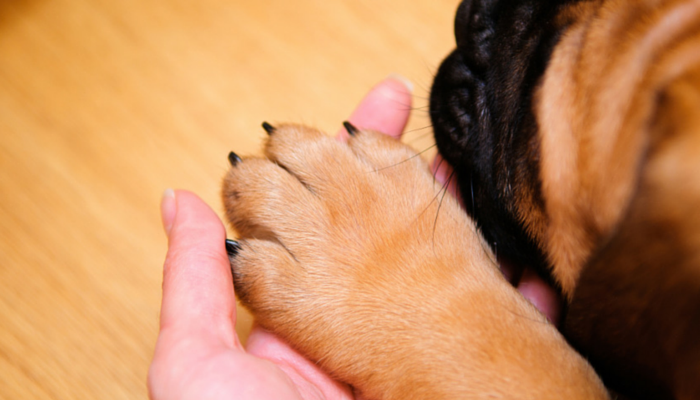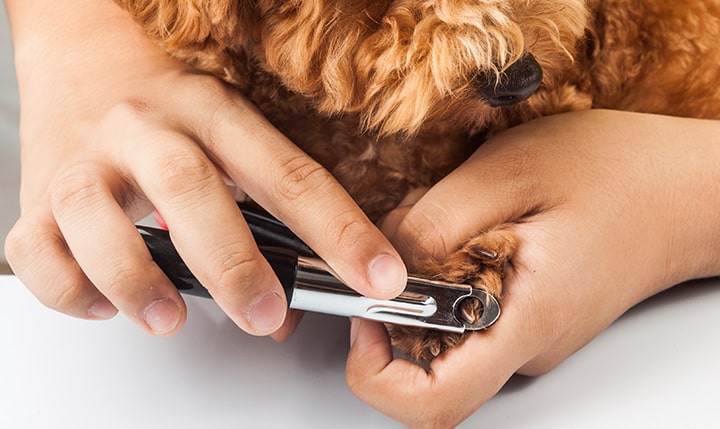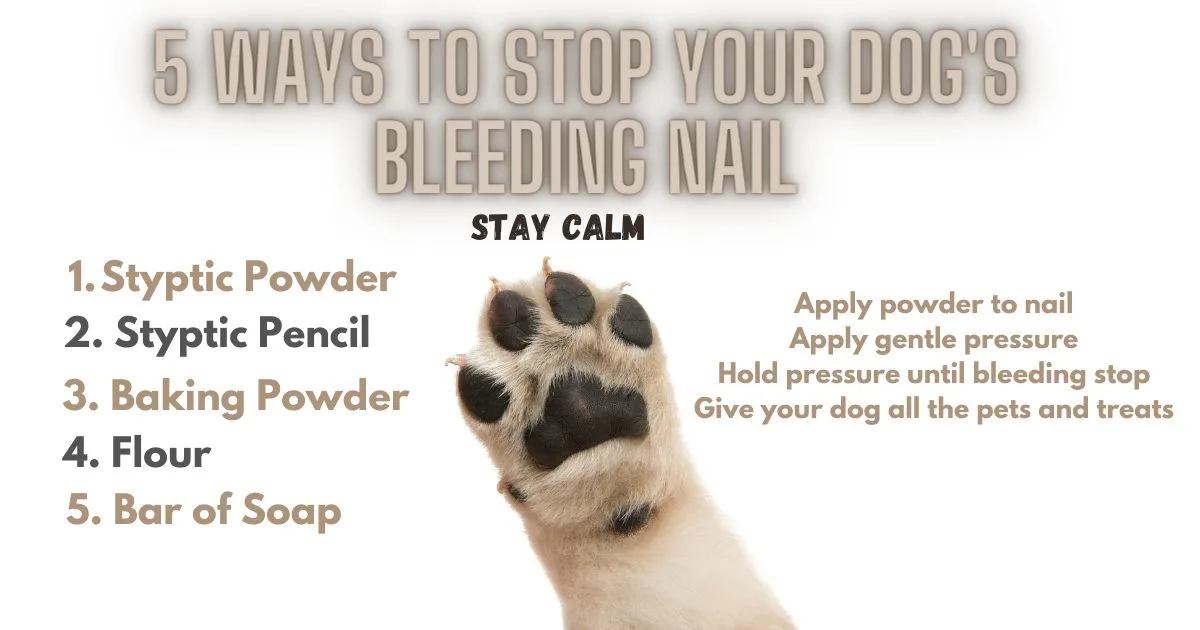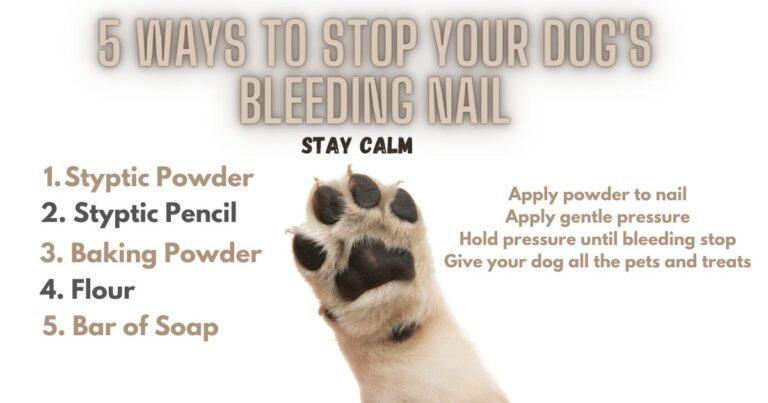To stop a dog’s nail from bleeding, apply pressure to the bleeding nail with a clean cloth or gauze until the blood clots and stops. Additionally, you can use cornstarch or flour to help the blood clot and stop the bleeding.
If the bleeding persists, it may be necessary to seek veterinary care for cauterization.

Credit: www.puppyleaks.com
Understanding Dog Nail Bleeding
When dealing with a dog nail bleeding, applying pressure with a clean cloth or gauze can help stop the bleeding. Hold it for a few minutes until the blood clots and stops. Cornstarch or flour can also be used to help the blood clot and stop the bleeding in most cases.
Causes Of Dog Nail Bleeding
There are several reasons why a dog’s nail may start bleeding. Some common causes include:
- Trimming nails too short: Cutting a dog’s nails too close to the quick can result in bleeding.
- Injury: Dogs can injure their nails by catching them on something sharp or by engaging in rough play.
- Nail splitting: Split nails can be painful and prone to bleeding.
- Underlying health issues: Certain health conditions, such as infections or tumors, can cause nail bleeding.
Signs And Symptoms Of Dog Nail Bleeding
It’s important to be able to recognize the signs and symptoms of nail bleeding in dogs. Some common indicators include:
- Visible blood: You may notice blood on your dog’s nails, the floor, or their bedding.
- Lameness or limping: Bleeding nails can cause discomfort and lead to changes in your dog’s gait.
- Vocalization: Dogs may whimper or yelp when they experience pain from bleeding nails.
- Excessive licking or chewing: Dogs may try to alleviate the discomfort by excessively licking or chewing their nails.
Why It’s Important To Stop The Bleeding
Stopping the bleeding from a dog’s nail is essential for various reasons:
- Pain relief: Bleeding nails can cause significant pain and discomfort for your furry friend.
- Infection prevention: Open wounds on the nail can potentially lead to infections if left untreated.
- Damage prevention: Continued bleeding can result in further nail damage or even nail loss.
- Quality of life: By addressing the bleeding promptly, you can ensure your dog’s overall well-being and improve their quality of life.

Credit: splashanddashfordogs.com
Methods To Stop Dog Nail Bleeding
If your dog’s nail bleeds from being cut too short, you can apply pressure with a clean cloth or gauze to help stop the bleeding. Cornstarch or flour can also help clot the blood. If bleeding persists, it may be necessary to seek veterinary care.
Applying Pressure To The Bleeding Nail
If you accidentally cut your dog’s nail too short and it starts to bleed, don’t panic. Applying pressure to the bleeding nail is a simple and effective way to stop the bleeding. Start by getting a clean cloth or gauze and gently wrap it around the bleeding nail. Apply firm pressure for a few minutes until the blood clots and the bleeding stops. This method is particularly effective for minor bleeding incidents and can be done at home without any special tools or products.
Using Styptic Powder Or Pencil
Styptic powder or pencil is a must-have item for pet owners and can be a lifesaver when dealing with a bleeding dog nail. Styptic powder contains a substance called aluminum sulfate, which helps in clotting the blood and stopping the bleeding. To use it, simply dip the bleeding nail into the powder or apply a small amount directly onto the nail. Alternatively, you can use a styptic pencil by gently rubbing it onto the bleeding nail. Make sure to keep the styptic powder or pencil in your pet first aid kit for emergencies.
Home Remedies To Stop Bleeding
In some cases, you may not have access to styptic powder or pencil. In such situations, there are a few home remedies that you can try to stop the bleeding. One of the most common home remedies is using cornstarch or flour. These household items help the blood clot and stop the bleeding. Simply sprinkle a small amount onto the bleeding nail or dip the nail into a bowl of cornstarch or flour. If the bleeding restarts, you can repeat the process. However, if the bleeding persists despite these home remedies, it’s important to seek professional help from a veterinarian.
Remember, accidents happen, and it’s natural to feel concerned when your dog’s nail starts bleeding. By applying pressure, using styptic powder or pencil, or trying home remedies like cornstarch or flour, you can quickly stop the bleeding and provide immediate relief to your furry friend. It’s always a good idea to have these supplies on hand as part of your pet first aid kit to be prepared for any nail bleeding emergencies.
When To Seek Veterinary Care
If you accidentally cut your dog’s nail too short and it starts bleeding, you can apply gentle pressure with a clean cloth or gauze to stop the bleeding. Hold it for a few minutes until the blood clots. Alternatively, you can try using cornstarch or flour to help the blood clot and stop the bleeding.
If the bleeding persists, it is best to consult a veterinarian.
If you’ve accidentally cut your dog’s nail too short and it starts bleeding, it’s important to know when it’s time to seek veterinary care. While most cases of nail bleeding can be managed at home, there are situations where professional assistance is necessary to ensure your dog’s safety and well-being.
Severe Bleeding That Doesn’t Stop
If your dog’s nail is bleeding excessively and the bleeding doesn’t seem to stop even after applying pressure, it’s time to seek veterinary care. Severe bleeding may indicate that a major blood vessel has been damaged, and professional intervention is required to stop the bleeding effectively.
Infections And Complications
In some cases, nail bleeding can lead to infections or other complications. If you notice any signs of infection, such as redness, swelling, discharge, or an unpleasant odor around the affected nail, it’s best to consult a veterinarian. They can assess the situation and provide appropriate treatment, such as antibiotics or cleaning the wound to prevent further complications.
Preventing Future Nail Bleeding Incidents
While dealing with a bleeding nail can be stressful, you can take measures to prevent future incidents. Regularly trimming your dog’s nails, using the right tools and techniques, can help minimize the risk of cutting too close to the quick. Keeping your dog’s nails at an appropriate length reduces the chances of accidental injuries and bleeding. Additionally, providing your pup with appropriate scratching surfaces can help keep their nails naturally worn down and less prone to injury.
In conclusion, knowing when to seek veterinary care for a bleeding dog’s nail is essential for their well-being. If the bleeding is severe and doesn’t stop with home remedies, if there are signs of infection or if you want to prevent future incidents, it’s best to consult a professional. By taking appropriate action, you can ensure your furry friend’s paws stay healthy and pain-free.

Credit: mybrownnewfies.com
Frequently Asked Questions Of How Do I Stop A Dog’s Nail From Bleeding
What If I Cut My Dog’s Nail Too Short And It Bleeds?
If you accidentally cut your dog’s nail too short and it starts to bleed, apply pressure to the nail with a clean cloth or gauze. Hold it for a few minutes until the bleeding stops. Cornstarch or flour can also help clot the blood and stop the bleeding.
If bleeding persist, consult your veterinarian.
Does Flour Stop Bleeding Dog Nails?
Cornstarch or flour can help stop bleeding in dog nails by helping the blood clot. Apply a small amount to the bleeding nail and apply pressure. If bleeding continues, seek veterinary care. Vaseline or styptic powder can also be effective.
Will A Dogs Bleeding Nail Heal On Its Own?
A dog’s bleeding nail may heal on its own. Applying pressure to the bleeding nail with a clean cloth can help stop the bleeding. Using cornstarch or flour can also help the blood clot and stop the bleeding. If the bleeding persists, cauterization may be necessary at the veterinarian’s.
Can Vaseline Help A Dog’s Nail Bleeding?
Applying Vaseline can help stop a dog’s nail bleeding, along with other products like styptic powder or cornstarch. It’s important to apply pressure with a clean cloth or gauze to clot the blood. If bleeding persists, consult a veterinarian.
Conclusion
Stopping a dog’s nail from bleeding requires some simple techniques. Applying pressure to the bleeding nail with a clean cloth or gauze can help stop the bleeding by allowing the blood to clot. In some cases, cornstarch or flour can be used to aid in clotting.
If the bleeding persists, it is recommended to seek veterinary assistance. Remember to handle your dog’s nails with care and take necessary precautions to prevent accidents.



